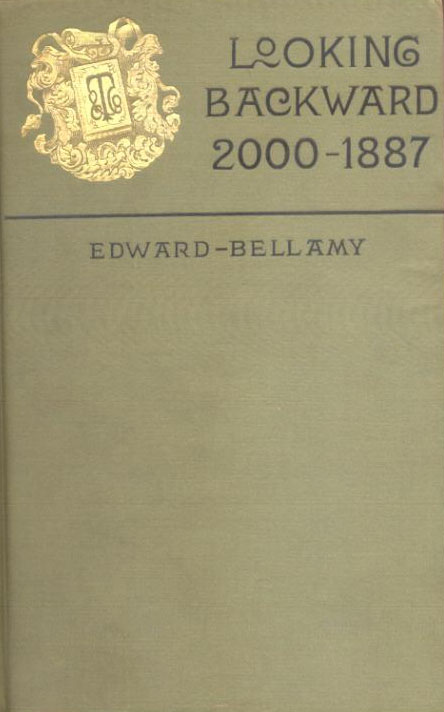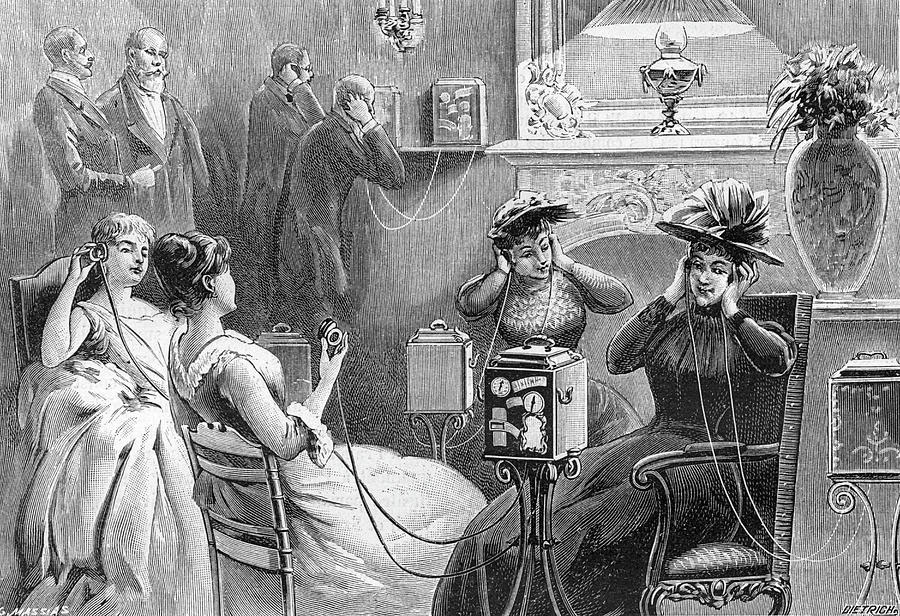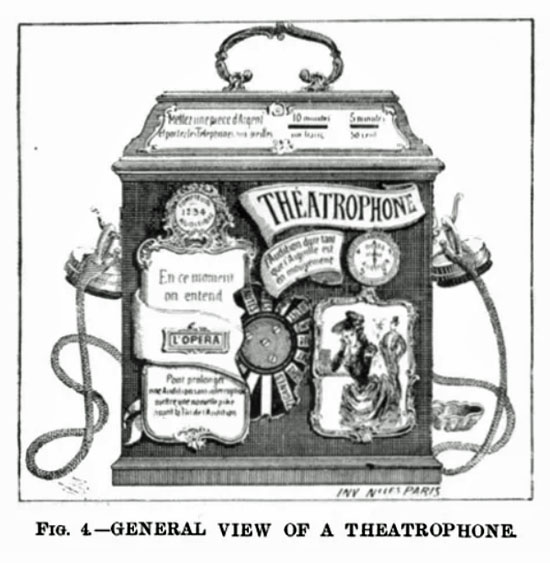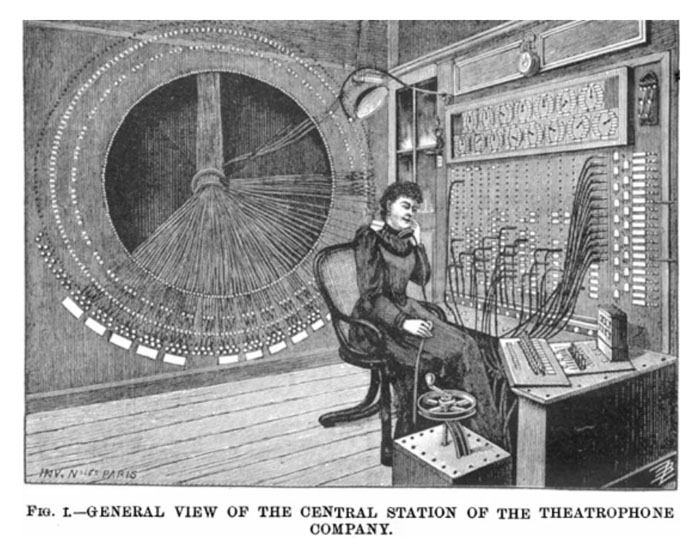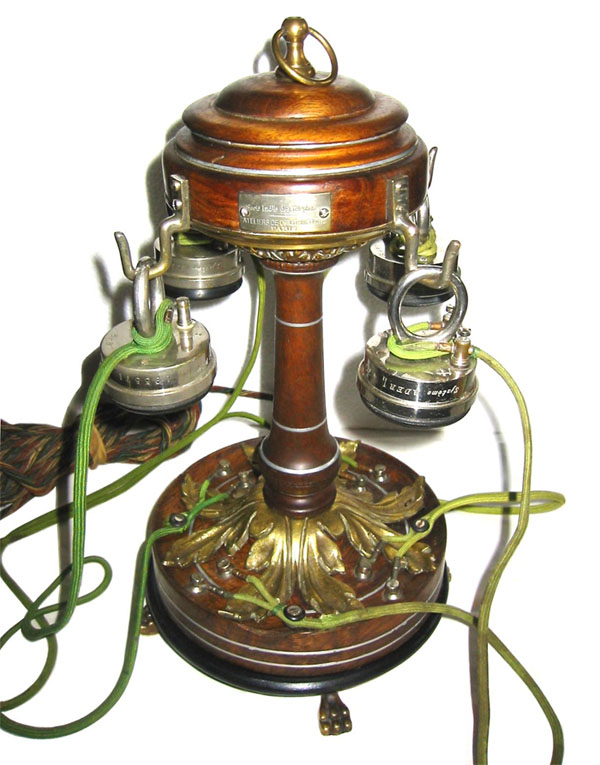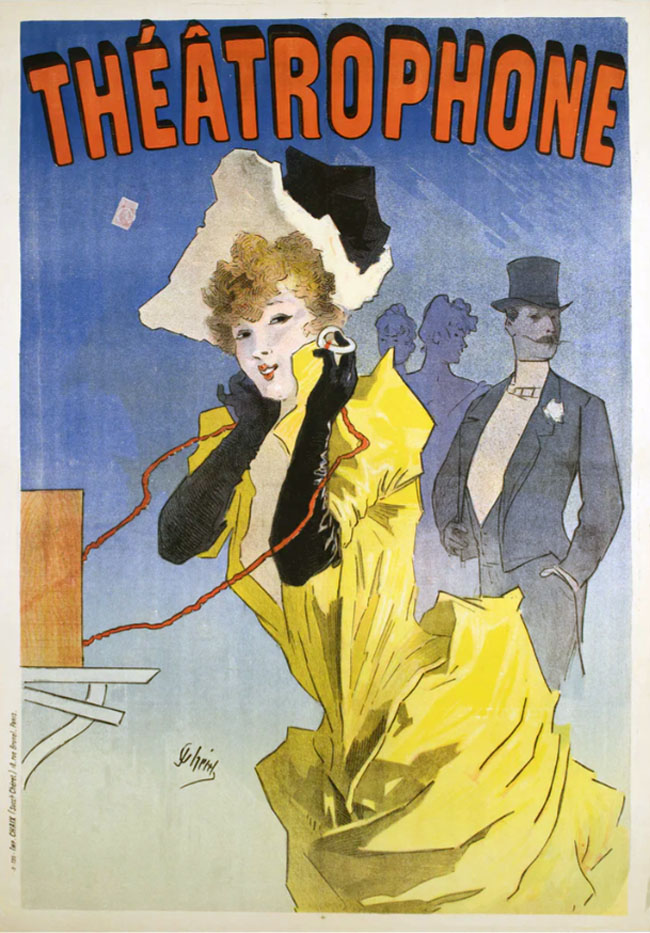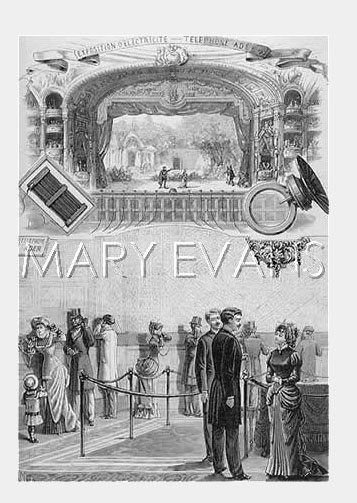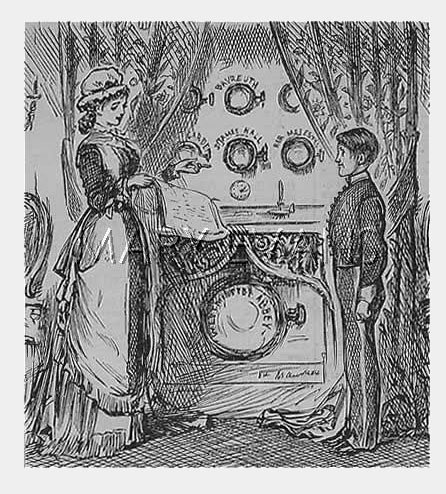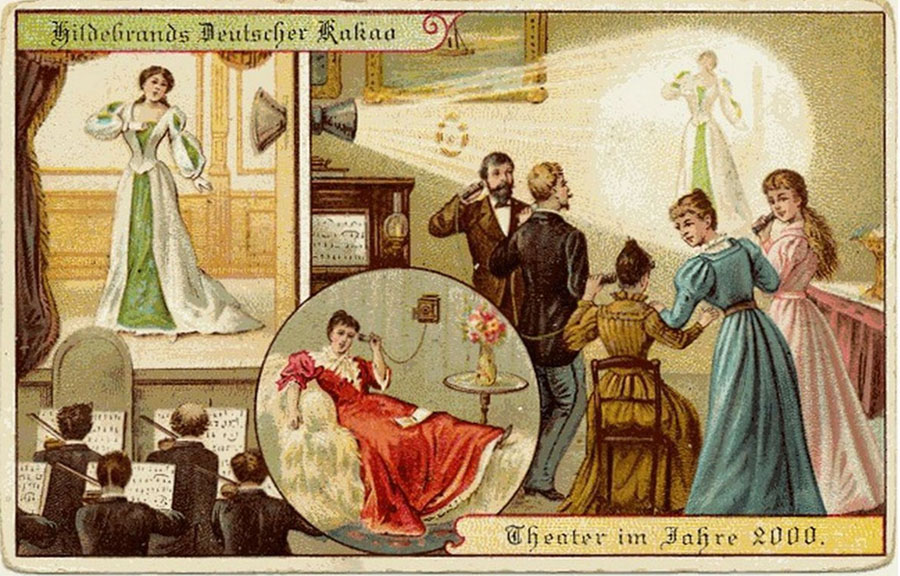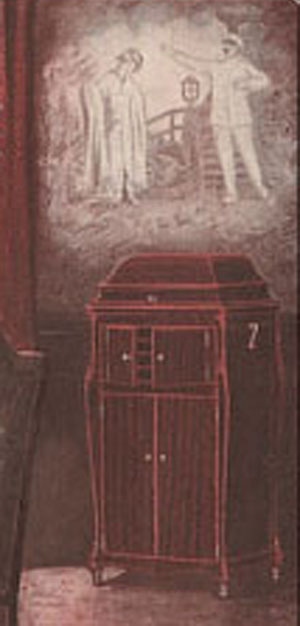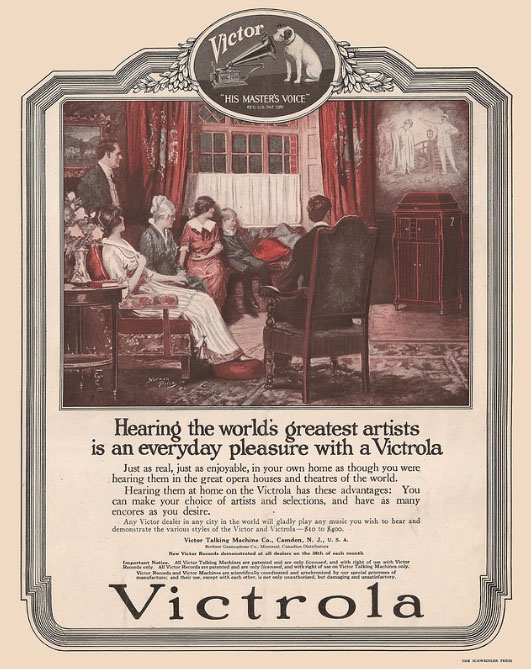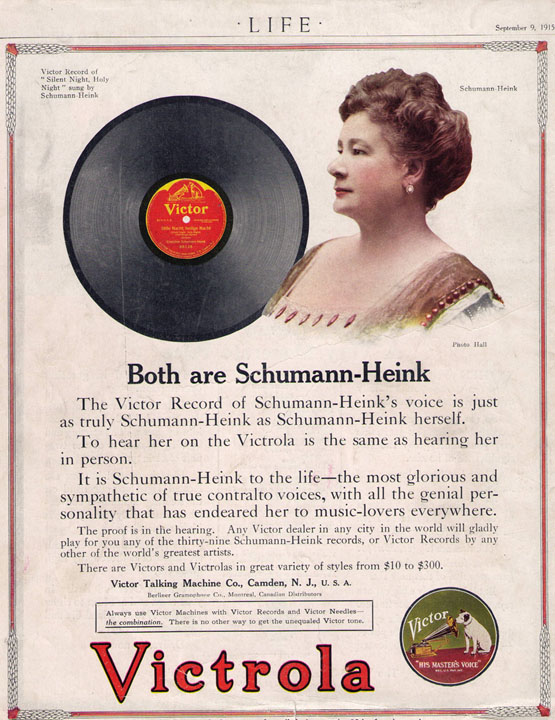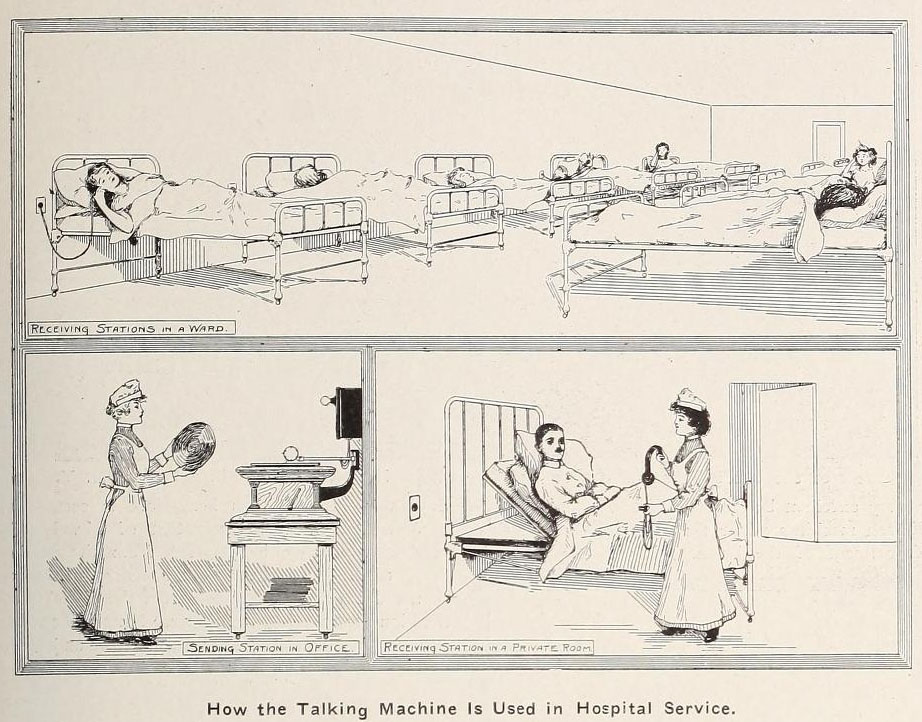By Edward Bellamy, Technor & Company., Boston 1888
Connections with Music in the Home - The Théâtrophone
By Doug Boilesen, 2022
Bellamy's novel tells the story of a hero figure named Julian West, a young American, who towards the end of the 19th century, falls into a deep, hypnosis-induced sleep and wakes up 113 years later. He finds himself in the same location (Boston, Massachusetts), but in a totally changed world: It is the year 2000, and while he was sleeping, the United States has been transformed into a socialist utopia. Looking Backward - Synopsis (Wikipedia)
There are no phonographs in Bellamy's story but Julian West is introduced in Chapter 11 to "musical service" for homes in the year 2000 which offered a "prodigious list" of available daily music. A system is described which uses a number of music halls around the country which are connected by a telephone to every subscribed home. Music is available every day of the week. "The corps of musicians attached to each hall is so large that, although no individual performer, or group of performers, has more than a brief part, each day's programme lasts through the twenty-four hours."
The 1876 telephone and the 1877 phonograph are closely related in history with many connections. Bellamy's music system in the year 2000 delivered music to the home using the telephone with benefits so similar to what the phonograph industry advertised that its phonograph could provide that Bellamy's book has been added to PhonoLiterature.
As will be seen Bellamy could have described whatever he wanted regarding the future of home music. Interestingly, the technology that he chose didn't use recorded sound or the phonograph or any transportation of performers visually into one's own living room.
In 1888 when Bellamy's book was released Edison had just returned to work on his phonograph after having abandoned it for nearly a decade. The phonograph was still in its infancy but it was a known reality and part of popular culture and many early predictions about the phonograph were again being repeated. "Letter-writing" and dictation were the first two probabilities that Edison identified in his 1878 article of phonograph titled The Phonograph and Its Future" and they were still the primary predictions for its commercial use in 1888.
When Edison was in Paris for the Exposition Universelle of 1889 the Phonograph was an extremely popular Exposition exhibit of Edison's. An article in the Western Electrician, September 28, 1889, reported an event at a private party in Paris attended by Edison and his wife where that "the phonograph was in successful operation, and was in constant use in one of the rooms, but the chief center of attraction was the room in which a telephone with a series of ear pieces was repeating music at the moment being played at the Grand opera House. The telephone table was constantly crowded with interested listeners."
The introduction of the first nickel-in-the-slot phonograph on November 23, 1889, by Louis Glass inside the Palais Royale Saloon in San Francisco would be a pivotal step towards the phonograph becoming an entertainment device. The early jukeboxes played music using cylinder records like the ones in Edison's first catalogue in 1890 which were called 'Musical Phonograms" and the commercial success of the coin-in-the-slots playing musical records would lead to the introduction of phonographs and records for the home once they were designed to be easier to operate, spring-powered, and cheaper. Perhaps if the "musical phonograms" had happened just a few months earlier then recorded music might have had a place in Bellamy's musical vision for homes in 2000.
Instead, Bellamy described a technology that was demonstrated in 1881 by Clément Ader at the 1881 International Exposition of Electricity in Paris. The Théâtrophone, as it would be called, used the telephone to transmit music to homes.
The Théâtrophone
The following is a brief history of the Théâtrophone. (Wikipedia Théâtrophone extracted 6-29-2022)
"The system was inaugurated by the French President Jules Grévy, and allowed broadcasting of concerts or plays. Ader had arranged 80 telephone transmitters across the front of a stage to create a form of binaural stereophonic sound.[1] It was the first two-channel audio system, and consisted of a series of telephone transmitters connected from the stage of the Paris Opera to a suite of rooms at the Paris Electrical Exhibition, where the visitors could hear Comédie-Française and opera performances in stereo using two headphones; the Opera was located more than two kilometers away from the venue.(2) In a note dated 11 November 1881, Victor Hugo describes his first experience of théâtrophone as pleasant.(3) (4) ."
"The théâtrophone technology was made available in Belgium in 1884, and in Lisbon in 1885. In Sweden, the first telephone transmission of an opera performance took place in Stockholm in May 1887.
In 1890, the system became operational as a service under the name "théâtrophone" in Paris. The service was offered by Compagnie du Théâtrophone (The Théâtrophone Company), which was founded by MM. Marinovitch and Szarvady.(5) The théâtrophone offered theatre and opera performances to the subscribers."
Ladies Listening to Théâtrophone, Engraving by Dietrich in 'La Nature', 1892 (Courtesy Mary Evans Picture Library)
"The July 2, 1892, Scientific American Supplement reported on the use of a device called the theatrophone that had been in use for two years already in Paris. The basic idea was to be able to call into a theater and hear live music being played. One could either subscribe to receive the service in home or utilize one of the theatrophones set up in various locales such as hotels, restaurants, vestibules, and cafes throughout the city.
For 50 centimes, one could listen to five minutes of music. A wicket on the front of the machine displayed the theater from which the music was heard. There was one central station where the Theatrophone Company operated out of, and this was connected to several secondary stations that were placed in the theaters. A series of microphones were set up on the stage and picked up the sound to be transmitted back to the central station." "In 1892 Live Music Was Just a Phone Call Away" by Mary Karmelek on May 20, 2011, Scientific American "Anecdotes from the Archive"
Scientific American, July 2, 1892
The phonograph and then the radio became the definitive home entertainment devices in the 1920's and 1930's. The théâtrophone and the Compagnie du Théâtrophone ceased operations in 1932.(5)
A théâtrophone instrument from La collection de Jean-Louis
Théâtrophone by Jules Cheret, poster circa 1896, Printer Chaix, Paris
The 'THEATRE-TELEPHONE' demonstrated to visitors to the Exposition d'Electricite, Paris; Source: Nielsen in 'Le Journal Illustre' 25 September 1881, page 309 (Credit Mary Evans Picture Library)
